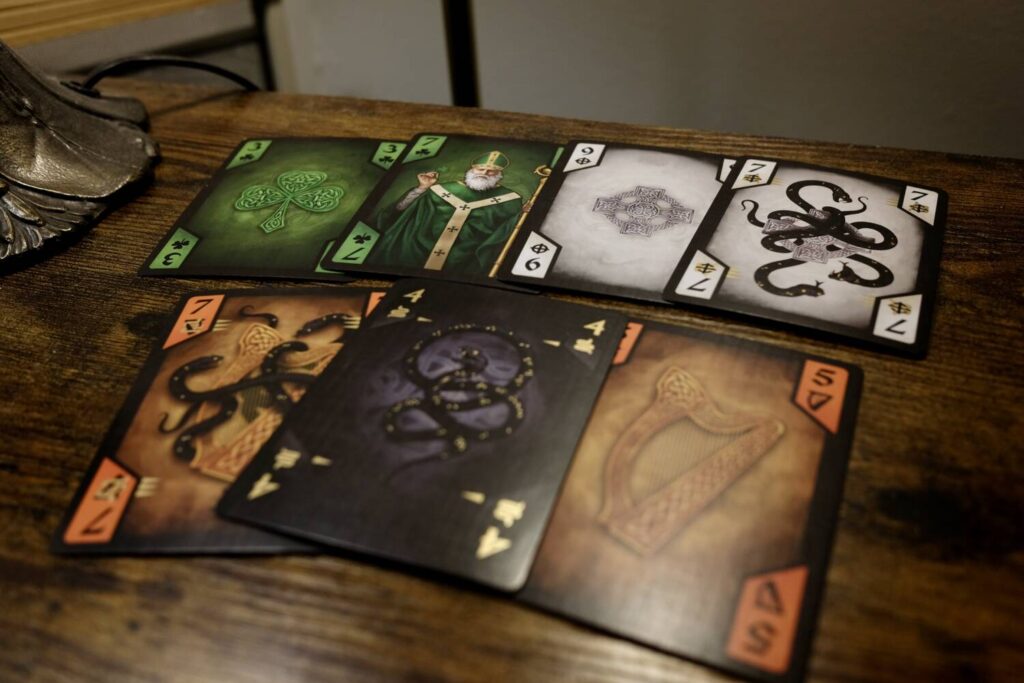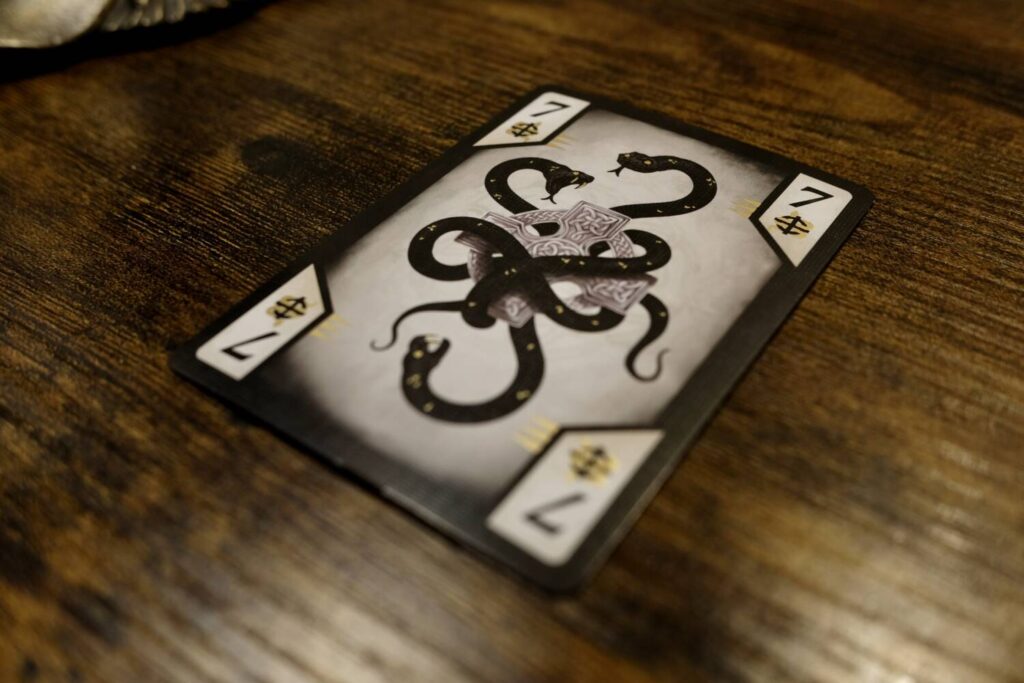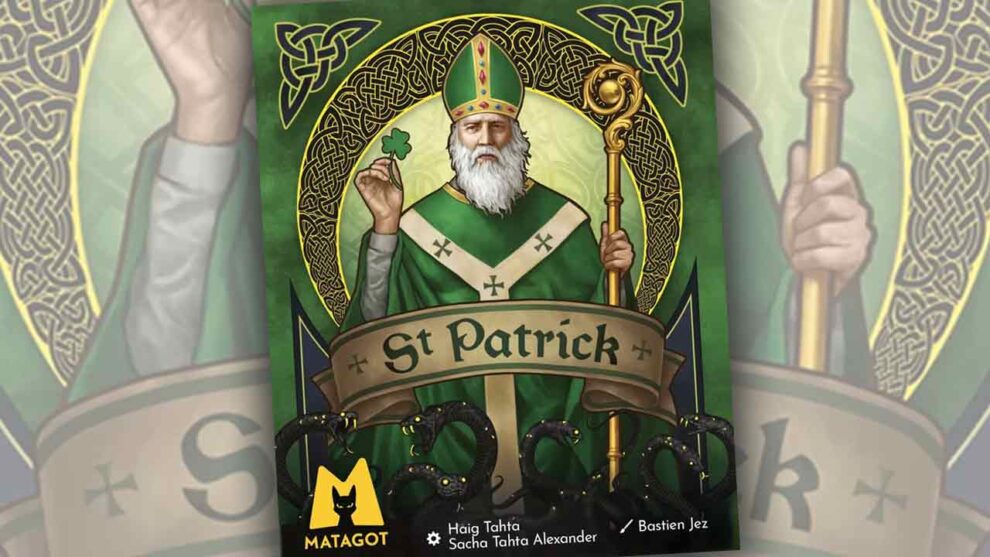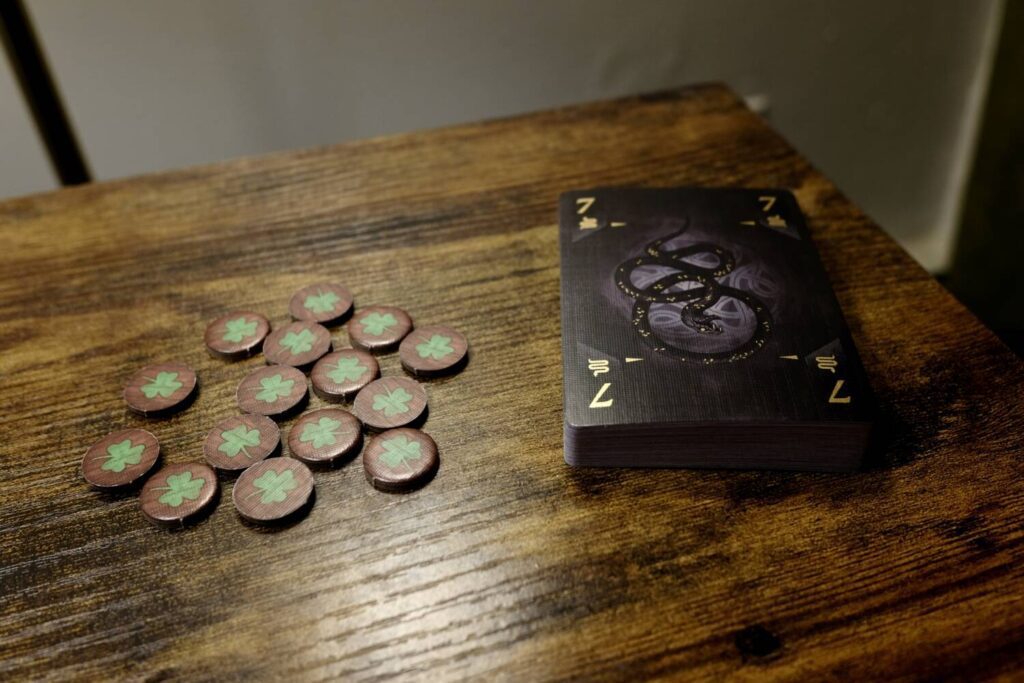St. Patrick is an approachable little trick-taker from designers Haig Tahta and Sacha Tahta Alexander. Originally printed as Salvage in 2021, publisher Matagot has loosely rethemed the game around the story of St. Patrick, who chased the snakes out of Ireland. I started to type “St. Sebastian” there, which would be a different trick-taking game indeed.
St. Patrick, it must be said, has been given an exemplary production. Artist Bastien Jez created some stunning illustrations for these cards, and they are well-complimented by Matagot’s choice of spot printing with metal foil. This deck is simultaneously readable and gorgeous. We truly are spoiled by contemporary production values.

Taking Care of Bid’ness
St. Patrick is a don’t-win trick-taking game, which means you want to avoid, well, winning tricks. Go figure. Specifically, you want to dodge any cards that include Snake Bites, which means you’ll be swinging wide of black cards and 7’s.
At the beginning of each round, after the full deck has been dealt out, the player in last place chooses whether or not everyone passes 1 or 2 cards to their left. They can, to clarify, decide not to pass any. After that, the bidding begins. This is the most unusual part of St. Patrick.
In the middle of the table, there’s a pile of 15 Relics, one for each Snake Bite in the deck. Beginning with the starting player, everyone takes turns claiming Relics. These protect you from Snake Bites, at a ratio of 1:1. Why shouldn’t the starting player just take all 15?
Well.
If the pile becomes empty, the round doesn’t start. Instead, everyone loses points equal to the number of tokens they claimed, which are then returned to the middle of the table. Then, in a fun bit of business that doesn’t come up as often as I suspect it should, everyone passes their hand to the left and the bidding process starts over.
I think that’s fun.
If, however, all but one player pass in the same round, then the trick-taking begins. You play through the hand, subtract your Relics from your Snake Bites, and lose health accordingly. The game ends once one player loses 20 or more health.
And Not Quite Working Overtime
There is, irrefutably, something missing from the bidding system in St. Patrick. Like your father’s suit, you can grow into it, but it never quite fits. Even so, it has cool moments. I’ve seen players opt to finish off the pile rather than suffer the indignity of their hand. You can also corner yourself by taking too many Relics, leaving everyone else to split what’s left. If we’re all going to lose 3 health and you’re going to lose 6, why wouldn’t we?
It is possible to lose the game as a result of taking too many Relics in a later round. It’s rare to see a contemporary game include a mechanic without also including a safety rail of some kind to protect you from yourself. I kind of like it. Makes me feel like an adult.

The Banality Is the Point
I’m of two minds here. There are an awful lot of trick-taking games, with more coming out every day, and you do hit a limit. I say that as an unapologetic nut for the genre, someone for whom the limit, in the words of Cady Heron, does not exist. It is a simple and irrefutable truth that, at a certain point, the returns on each new game in a genre are diminished. That’s why we end up with cycles of certain mechanics taking off and then inevitably receding.
Furthermore, as we’ve discussed here before, there are too many games. I find myself most aware of that whenever I play something that’s good but not great. I’m more likely to think “There are too many games” when playing the 20th new release this year that rates 7/10 than I am when playing something terrible or something exquisite. St. Patrick falls firmly into that camp. I think it’s good, even if I don’t think it adds anything new to the conversation.
If you are looking for one trick-taking game to add to your collection, and you want that one game to be exemplary of what the genre can do, St. Patrick isn’t it. The highs here are nowhere near high enough. You want Seas of Strife or either version of The Crew. Among the best games ever published, both of those games produce laughter, fear, frustration, and rich choices. If you are looking for something deeper and stranger, consider Ghosts of Christmas or Cat in the Box. If you want teams, which St. Patrick doesn’t accommodate, you should get Tichu or Yokai Septet. I could go on.
If, however, you are looking for an introduction to contemporary trick-taking, for a game that is representative, St. Patrick is close to perfect. It presents as unremarkable precisely because it does the whole thing well, and without flash. It’s a simple must-follow design, with defensive bidding and no trump suit. Unlike Oh Heck or 9 Lives, St. Patrick doesn’t necessitate precision bidding in order to do well, which is exceedingly difficult for new players to get right. The cards you don’t want are easy to remember. The rounds are quick. That all adds up to an approachable game with moments that sing.
Paradoxically, the fact that St. Patrick doesn’t stand out is exactly what recommends it. This is a mid-budget genre picture, directed by a steady hand and scored by Jerry Goldsmith. We used to complain about having too many of those, too.












Add Comment